- Home
- Richard Matheson
Somewhere in Time Page 6
Somewhere in Time Read online
Page 6
Left the papers on the lobby sofa. Went to the Victorian Lounge. Drank a Bloody Mary. Signed for it. Got up and went downstairs to the Arcade. Went into the Game Room and played a baseball game, a computer quiz game, a golf game, a pinball machine. The room was empty, the machines clattered, and I wanted to break every one of them with a sledgehammer.
Went back upstairs, passing people in evening clothes. Big do in the Ballroom; Car Crash conference. Felt like stopping them. Telling them how it feels when your spirit has a head-on collision with reality.
Another Bloody Mary in the Victorian Lounge. Couple in the next booth arguing. Envied them; they were alive. I sat there drained, degutted, drawn, and quartered. Had a third Bloody Mary. Signed the bill; Room 527, Richard Collier. Went upstairs to throw myself out the window. Didn’t have the nerve. Watching the boob tube instead.
I’ve never felt so empty in my life. So totally devoid of purpose. People who feel like this die. The will to live is everything. When that goes the body follows.
I’m standing on nothing. Like a character from a movie cartoon who runs off a cliff yet keeps on moving in midair a while before he notices.
I’ve noticed.
Now begins the fall.
November 18, 1971
Ten twelve a.m. My final entry at the hotel. I’m leaving shortly, on my way to Denver. I really don’t feel like making an entry. Still, there’s no reason I should give up my book just because I’ve given up a fool delusion.
I’m sitting at the writing table, having juice, coffee, and a blueberry muffin—my concluding continental breakfast prior to departure.
Nature, damn her, has contrived to reflect my mood. For the first time since I got here there’s no sunlight; it’s gray, cold, and windy. Out above the murky green ocean is a bank of dark clouds. I can see now that there’s probably a lighthouse on Point Loma. A light keeps flashing on and off—the turning beacon, I assume.
I see a man jogging along the edge of the surf. A dark, military helicopter just went sweeping along the shoreline like some enormous water bug. The parking lot below is speckled with dead, yellow leaves. The wind is whipping some of them around so rapidly they look like pale mice scattering across the asphalt paving. A bald man wearing a green jumpsuit is riding a red bicycle on the lot. There’s a seagull overhead, drifting out of sight on a sweep of wind.
I’ll pack my things now; maybe take a last walk around. Can’t stay here any longer.
Now the ocean has no color at all. Gray lines moving toward the dull brown beach.
Cold. The wind cuts through me. Why did I come out here anyway?
I’m entering the Hall of History for the last time. Walking on the white and black tile floor. Past the gold-framed photograph of the hotel as it was. There’s a carriage in front, four horses harnessed to it. There’s a man leaning against his bicycle.
Here’s the bedroom display. I pass it by. Here’s a hand-painted dish in its case—white with green and gold patterns and a pair of floating blue angels.
Here’s a photograph, taken in 1914, of a bus which picked up people from the trains and brought them to the hotel entrance.
Here’s the program for The Little Minister. Here’s her photograph.
I’m looking at it through a blur.
There’s an iron and another dish with a painting of the hotel on it. There’s the telephone and hotel register and napkin ring and menu and something that looks like a printing press. I pass them by and walk along the corridor toward the stairway leading to the patio. I’m leaving everything behind to—
Wait a second!
People stared at me as I raced across the patio. I didn’t care. Nothing mattered but what I was doing. I even failed to open the lobby door for an old woman close behind me. I yanked the door open and plunged inside. I wanted to run across the lobby but controlled myself. Heartbeat clubbing at my chest, I walked across the lobby, strides as long as I could make them, and went up to the desk.
“Yes, sir, can I help you?” asked the man.
I tried to look and sound casual; normal anyway—casual was beyond me. “I wonder if I could speak to the manager?” I asked.
“I’m sorry, he’s in Florida right now.”
I stared at him. Was I to be defeated already?
“Perhaps you’d like to speak to Mr. Lyons,” said the man. “He’s handling things until the manager gets back.”
I nodded quickly. “Please.”
He pointed toward an alcove to my left. I thanked him, moved there quickly, saw a door, and knocked on it. No one answered so I went inside.
The office was empty, but to my right was another office with several people working in it. One of them, a secretary, came in. I asked her where Mr. Lyons was and she said he’d just stepped out but might return at any moment. She asked if she could help me.
“Yes,” I said. “I’m a television writer and I’ve been assigned to prepare a special program about the history of the hotel.”
I told her that I’d been to the Hall of History, the local library, and the main library in San Diego but had been unable to locate enough material and was at a standstill and needed assistance.
“I thought, perhaps, you might have some material on the hotel’s background in your files,” I said.
She said she thought they might but couldn’t say for sure. Mr. Lyons could, however, since he’d worked for the hotel since he was fourteen when he started as an elevator operator.
I nodded, smiled, and thanked her, and left the office. How could I wait to see Mr. Lyons when the need to find what I wanted was like a feeling of starvation? I walked across the lobby, sat on a chair, and stared at the office door, waiting for Mr. Lyons to come back; willing him to return. “Come on, come on,” I murmured over and over.
Finally, I couldn’t stand it any longer and got up to return to the office. As I did, the secretary came out. When she saw me, she changed direction, and moved toward me. We seemed to approach each other with a dreamlike slowness.
Then she was in front of me and telling me that, perhaps, the person I should talk to was Marcie Buckley, who worked in the Lawrence office (Lawrence is the man who, apparently, owns the hotel) and had prepared a short book entitled The Crown City’s Brightest Gem, about the history of the hotel.
She pointed the way to me, I thanked her, smiling (I think I smiled), and walked through the Promenade Room, up a small ramp, and opened a glass door. Inside the office was an old man and two women, one of them at a front desk, facing me.
“I’d like to speak to Marcie Buckley,” I said.
The attractive young woman returned my look. “I’m Marcie Buckley,” she told me.
I smiled again, repeating my lie. Television special, research standstill, need for further information. Could she help me?
She was nicer than I expected; certainly nicer than I merited. She pointed toward a desk at the rear of the office. It was piled with books and papers; hotel documents she’d gathered. Would I like to look through them? she asked. I was welcome to as long as I left them in the order in which I found them. She was working on a full-length history of the hotel and was using the material for research.
I thanked her and sat at the desk, glanced quickly through what was there, and saw, with a pang so sharp it was like physical pain, that what I was looking for wasn’t there.
I couldn’t just get up, though. If what I wanted did exist somewhere, I’d have to ask her help in finding it and, if I stood up right away and said I had no use for all this carefully gathered material, she’d probably be offended; have a perfect right to be.
So I sat there, agonized, looking at scrapbooks with newspaper accounts of tennis tournaments and dress balls and the Pillsbury baking contest; at photographs of the hotel at various dates in its history; at books with carbon copies of letters written by various managers. “Our resident physician has had many years experience in New York in native practice … . Business is springing up and we anticipate a busy season …
. It gives me pleasure to let you know our winter rates … . Your favor of the 14th is received but we cannot use any hogs at present … .” I pretended to record the information.
Finally, when I felt that a respectable period of time had passed, I got up and walked back to Marcie Buckley’s desk. All good, I said; most helpful. I wondered though if there was any more; a storage room somewhere, perhaps?
My heart jumped when she said there was. Sank when she said she’d try to show it to me later; she was very busy then. I didn’t dare say more than thank you. I wanted to drag her away from her desk and force her to take me there that very instant. I couldn’t, of course. I smiled and nodded and asked her when she thought she could do it.
She checked her watch and said she’d try to do it at about a quarter to twelve. I thanked her again and left. I looked at my watch. It was just past eleven. Those forty minutes looked, to me, longer than those seventy-five years.
I returned to the chair in the lobby and sat again, feeling numb and out of touch with everyone who moved around me. Does a ghost feel like this? I remember wondering. I tried not to look at my watch. I tried to drift into a reverie, to pull myself away from Time 1. What if I was doing all this for nothing? I kept thinking. I felt I couldn’t survive that.
At a quarter to twelve, I went back to the Lawrence office. She was still working. I couldn’t insist. What right had I to insist even though my mind screamed out my need to get things going?
At three minutes after twelve, Marcie Buckley got up and we left the office.
I don’t know what I said; I can’t remember the words. She kept asking me about the special. My lies were dreadfully apparent. I prayed she didn’t know anything about the television industry; if she did, she’d know that I was talking gibberish. I told her that ABC had hired me but gave her the name of a producer who does “Ironside” for NBC. I gave her my agent’s name as that of the director. I lied incessantly and poorly. I apologize, Miss Buckley.
Then, somehow, I managed to shift the questions to her so I could listen instead of lie.
She told me she’d taken on the job of hotel historian on her own; that there hadn’t been one, that the hotel’s records were in terrible condition, and that she was trying to rectify the problem. I know I got a very good impression of her. She loves the hotel and wants to preserve its history; wants to help make it a national as well as a state landmark, which it is.
All the time she spoke, she led me downstairs, through what seemed like endless catacombs and to an office where she got some keys from a man.
By then my head felt like someone else’s head. I could hear and feel my shoes thudding on the concrete floor but it seemed as though someone else was wearing them. I think, in that period of time, I came as close to losing my sanity as I’ve ever come. I don’t know why she didn’t notice. Maybe she did and was too polite to mention it.
We went to the wrong place first. We moved around in a series of rooms that had once been cisterns; openings had been broken through the thick walls, connecting them. “They were going to collect rainwater in them at one time.” I’m sure she said that; it sticks in my mind.
Then we were walking again and she was telling me about the hotel. What she said is vague and disjointed in my mind. Something about the structural soundness of the timbers, I think. Something about a tunnel somewhere. Something about every room in the hotel being furnished differently; I must have gotten that wrong. Something about a circular room in a tower where some old lady lives permanently.
Finally, then, after hiking through endless cellar corridors, up stairs, and through the noisy kitchen, past the banquet rooms, outside, around the hotel, down through another doorway, finally we were in the corridor which ends in the Prince of Wales Grille and she was stopping at a plain brown door, unlocking it.
We went inside. The room was warm. There were chairs piled up. We had to move them to get to another door. “This other room is really hot,” she said as she unlocked the inner door and opened it, switching on a dusty bulb near the ceiling. The room was approximately ten feet by seven, its ceiling low, no more than a few inches above my head, with wrapped pipes crossing it. She was right about the heat. It was unbelievable; like walking into an oven. “Those pipes must be heat ducts,” she said. “It’s really a terrible place to keep important records.”
I glanced around the room. The walls were cement, their whitewash fading. Everywhere I looked were shelves with books, a tabletop piled high with books. Immense books, some of them a foot and a half long and almost a foot wide, several inches thick. Everything was covered with a layer of gray dust such as I’d never seen in my life—the dust of attics and cellars left untouched for generations.
“Is there something in particular you’re looking for?” she asked.
“Not exactly.” Lying again. “Just color … information.”
She stood in the next room, watching me. I rubbed my thumb across the faded, red-leather spines of the books. My thumb became gray. I lifted a heavy book and a cloud of dust rose in the air. I coughed and put the book aside. Already, sweat was trickling down my neck. I brushed my hands off and removed my jacket.
She seemed hesitant but finally said, “I’m going to get some lunch. You want to stay here while I do?”
“If that’s all right,” I said.
“Well …” I knew she was concerned for the records. “Just be careful.”
“I will.” I managed a smile. “And I appreciate your help, Miss Buckley. You’ve been very kind.”
She nodded. “That’s all right.”
I was alone then and the anxiety I’d had to hide from her seemed to emerge with a rush; I began breathing through my mouth as I moved around. There were covered boxes stacked behind the table. I crouched to pull off one of the dusty covers and saw sheafs of yellowing bills and receipts inside, heavy ledgers books. I put the cover back and stood, the movement making the room go dark in front of me. I staggered and caught hold of the table, shook my head. Recovering, I pulled out my handkerchief and wiped my face.
I moved from shelf to shelf, rubbing off the thick-ridged book spines. Everything I touched or bumped against scaled gray dust into the air. I had to keep clearing my throat and coughing. I felt ominous tendrils of pain in my head. I had to finish soon or I’d never make it.
I found a book spine dated 1896 and pulled it from between two heavy ledgers, gagging at the dust that clouded around my head. It was a book of correspondence carbons. I glanced through them quickly; maybe there was something there.
Many of the pages were as blank as though the carbons had been typed with vanishing ink. My heartbeat jumped as I saw a letter dated October 6 which began “My Dear Miss McKenna.” Drops of perspiration ran into my eyes, stinging them. I rubbed at them hastily, fingered drops of sweat from my eyebrows and flicked them away. “I take great pleasure in answering your note of September 30. We are looking forward with anticipation to your arrival and the performance of The Little Minister at the hotel.”
The letter went on to say that he (the manager) was sorry they could not have presented the play during the summer season when there were more guests at the hotel; but “beyond question we would rather have it now than not at all.”
I shook my head abruptly. I was getting faint. I wiped at my face and neck again. My handkerchief was getting soggy. Sweat was trickling down the small of my back and across my stomach. I had to step into the next room for a few moments. As warm as it was in there, it felt, in contrast, as though I were moving into cool air. I leaned against the concrete wall, gasping for breath. If it isn’t in there—It was all I could think. If it isn’t in there—
I went back into the storage room and started rubbing my palms quickly and impatiently across book spines. Come on, I mumbled. I kept saying it again and again like some desperately stubborn child who will not allow himself to see that what he wants is unavailable. “Come on, come on.” Thank God, Marcie Buckley didn’t come back then. If she had, s
he il have felt compelled to get a doctor, I’m sure. I was no longer, as they charitably put it, “in control of my faculties.” Only one thread kept me from unraveling entirely: the thing I sought.
I had to concentrate on that because, by then, I was enraged at the hotel, enraged at all its past authorities for permitting these records to come to such a state. If they’d only seen to it that the records had been stored the way they should have been, I would have had my answer in seconds. Instead, the minutes dragged by maddeningly as I searched in vain for the one scrap of evidence I needed to survive. I felt like Jack Lemmon in that scene in Days of Wine and Roses where he runs amuck in the greenhouse, looking for a bottle of whiskey. What kept me from running amuck I’ll never know; my quest, I can only assume. Otherwise, I would have howled and ranted and flung books and papers in all directions and wept and cursed and become demented.
I didn’t even bother wiping off the sweat now. What point was there in that? My handkerchief was soaking wet; my underclothes clung to me as though I’d gone swimming in them. My face was probably beet red. I’d lost all sense of time and place. Like a somnambulist, I searched and searched, knowing that my search was futile but so caught up in the stricken madness of it that I couldn’t stop.
I almost missed it. By then my eyes were barely focusing. I kept discarding books, putting them aside. I put aside the right one too. Then something—God knows what—pierced the murk of my brain and, with a shocked gasp, I twisted back to the book and picked it up. I flung it open and turned the pages with a shaking hand until I’d reached the one on which it read, in giant letters, THURSDAY, NOVEMBER 19, 1896 / HOTEL DEL CORONADO / E. S. BABCOCK, MANAGER / CORONADO, CALIFORNIA.

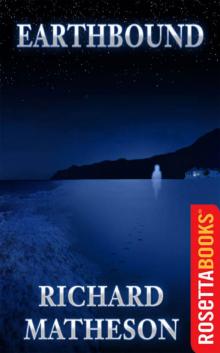 Earthbound
Earthbound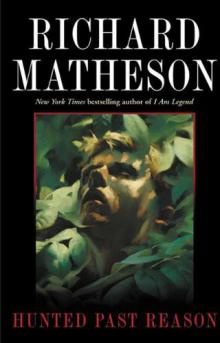 Hunted Past Reason
Hunted Past Reason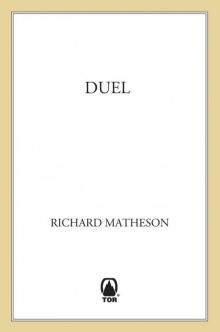 Duel: Terror Stories
Duel: Terror Stories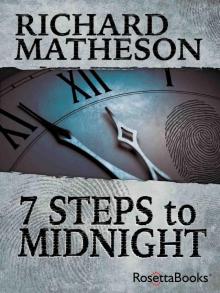 7 Steps to Midnight
7 Steps to Midnight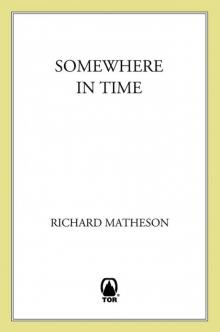 Somewhere in Time
Somewhere in Time Ride the Nightmare
Ride the Nightmare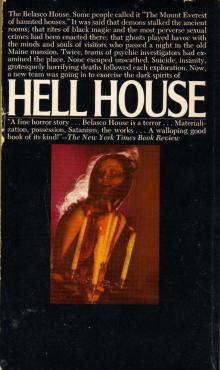 Hell House
Hell House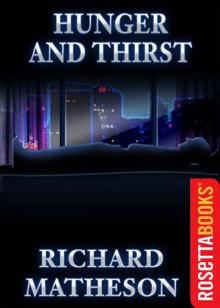 Hunger and Thirst
Hunger and Thirst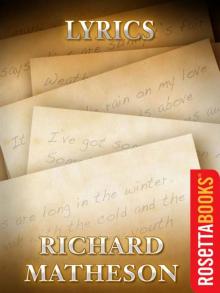 Lyrics
Lyrics Other Kingdoms
Other Kingdoms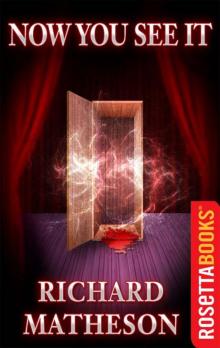 Now You See It . . .
Now You See It . . .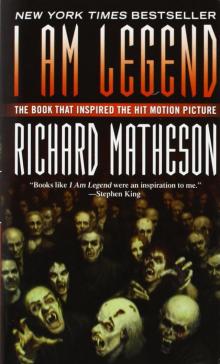 I Am Legend
I Am Legend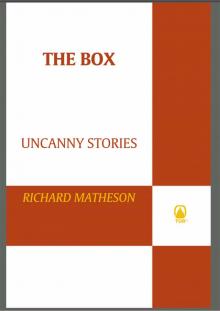 The Box: Uncanny Stories
The Box: Uncanny Stories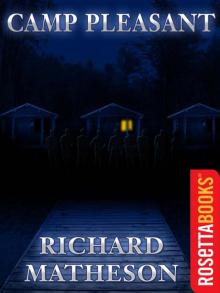 Camp Pleasant
Camp Pleasant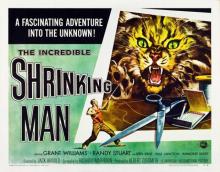 The Incredible Shrinking Man
The Incredible Shrinking Man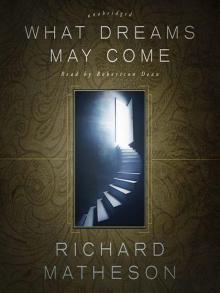 What Dreams May Come
What Dreams May Come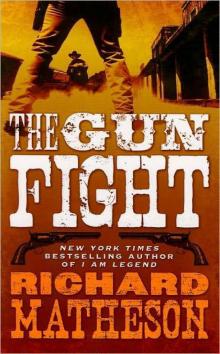 The Gun Fight
The Gun Fight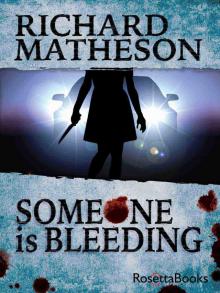 Someone Is Bleeding
Someone Is Bleeding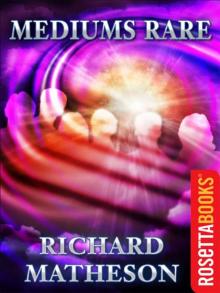 Mediums Rare
Mediums Rare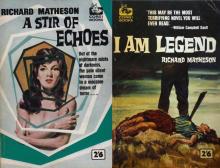 A Stir of Echoes
A Stir of Echoes Backteria and Other Improbable Tales
Backteria and Other Improbable Tales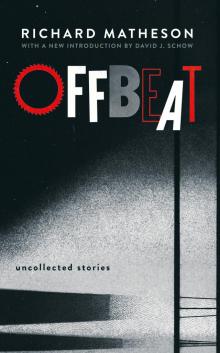 Offbeat: Uncollected Stories
Offbeat: Uncollected Stories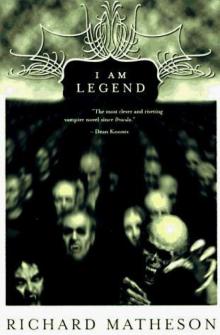 I Am Legend and Other Stories
I Am Legend and Other Stories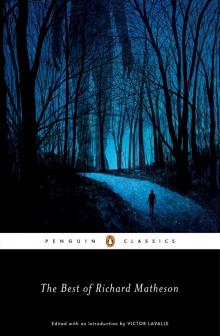 The Best of Richard Matheson
The Best of Richard Matheson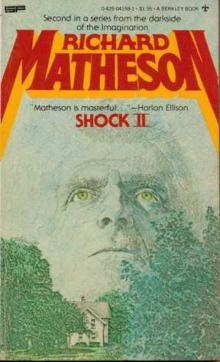 Shock II
Shock II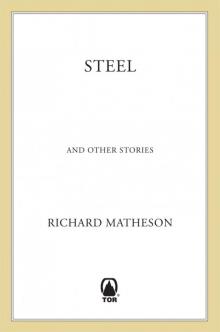 Steel: And Other Stories
Steel: And Other Stories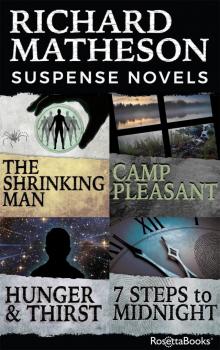 Richard Matheson Suspense Novels
Richard Matheson Suspense Novels The Link
The Link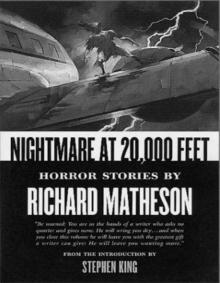 Nightmare At 20,000 Feet
Nightmare At 20,000 Feet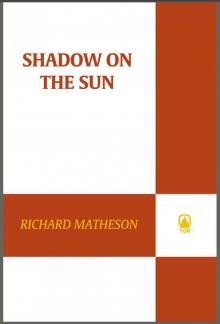 Shadow on the Sun
Shadow on the Sun![Steel and other stories [SSC] Read online](http://i1.bookreadfree.com/i/03/21/steel_and_other_stories_ssc_preview.jpg) Steel and other stories [SSC]
Steel and other stories [SSC] Created By
Created By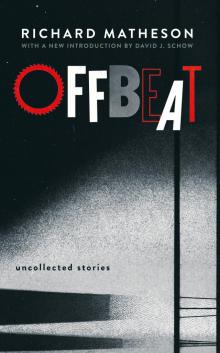 Offbeat
Offbeat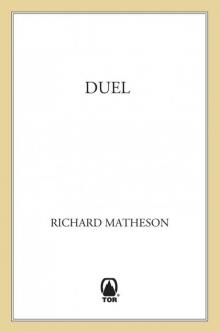 Duel
Duel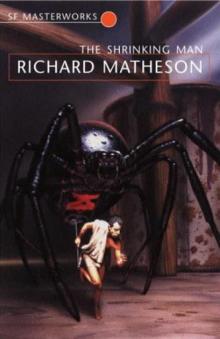 The Shrinking Man
The Shrinking Man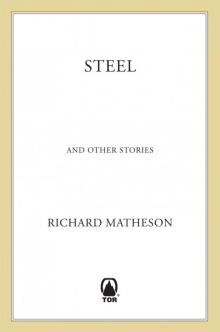 Steel
Steel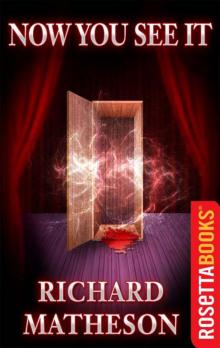 Now You See It
Now You See It